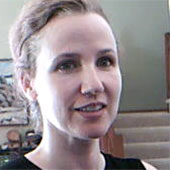Growing Up In the Shadow of Domestic Violence, Part 2
- Tweet
 Hostile words hurt, and kids may be affected at a very young age! Tweet this!
Hostile words hurt, and kids may be affected at a very young age! Tweet this!Witnessing family aggression is traumatic and damaging. How many kids are affected? Studies have offered several answers, including estimates that approximately one-third of all American adults have observed domestic violence at some point during childhood.
That sounds like a lot, but things might be even worse than the numbers suggest. That’s because surveys have tended to focus on rates of physical aggression, and new research tells us that witnessing verbal aggression may be just as harmful to a child’s development. In fact, it might even be more destructive. If you think a child is safe because she hasn’t witnessed physical violence, think again.
The Effects of Verbal Aggression Last Through Adulthood
Take, for example, recent brain scan studies of young adults at Harvard Medical School. When researchers compared individuals on the basis of childhood experiences, they found that people who had witnessed family violence had altered brain circuits and less brain tissue in areas that process and interpret sensory information about upsetting events.
But some experiences seemed to be more damaging than others. The biggest predictor of brain abnormalities wasn’t witnessing physical violence, but witnessing verbal aggression—like insults, angry threats, and nasty remarks.
Psychological research tells a similar story. When investigators at the University of Maryland screened college students for emotional problems, they found that exposure to domestic violence during childhood increased a person’s risk of depression, anxiety, interpersonal problems, and trauma symptoms. But when it came to the type of family violence observed, it was witnessing verbal aggression – not witnessing physical conflict – that was the stronger predictor of psychological symptoms.
Angry Voices Affected Babies Under One Year Old
So hostile words hurt, and kids may be affected at a very young age. At the University of Oregon, Alice Graham and her colleagues monitored brain activity in a group of babies (6-12 months old) while they listened to audio recordings of an unfamiliar adult voice. Some of the babies had been growing up in households where parents engaged in lots of angry, but non-physical, conflict. Other babies lived in more peaceful homes.
Did it make a difference? It certainly appears that way. The babies from high-conflict homes showed a distinctive pattern of brain activity when they heard the adult stranger speaking in a very angry tone of voice. Unlike other babies, they experienced more activation in brain regions linked with the processing of emotions and stress – brain regions that are typically altered in adults with stress disorders.
Such studies may offer us a glimpse of the early stages of brain development going off-track. But we don’t need live brain scans to tell us that witnessing verbal aggression can change children’s lives. Decades of research confirms that early life stress can cause a host of problems, including emotional disorders and impaired brain growth. And one of the biggest stressors that a young child can experience is the perception that his caregiver is under threat.
It seems so straightforward, but we can’t fix the problem if we don’t acknowledge it. Many parents who would never imagine themselves in a physically abusive relationship are nonetheless exposing their kids to destructive verbal aggression. To make kids feel safe and protect kids from toxic stress, consider these evidence-based tips.
Tips to Protect Kids from Harm
- Remember that it starts early – even before birth. When a pregnant woman is the repeated target of verbal aggression, her body gets flooded with stress hormones, and these hormones can have lasting effects on the baby’s body and brain.
- Don’t assume a baby is too young to notice. It’s tempting to think that young children don’t know what’s going on, but clever experiments suggest otherwise. Babies notice when their parents are upset and tend to “mirror” their parents’ stressed-out biological responses.
- Don’t kid yourself that your child can’t hear you because he’s asleep. In that experiment on infants from high-conflict homes, the babies were listening to angry voices – and showing signs of stress -- in their sleep. Young children don’t have to be awake to be affected by our fights.
- Watch out for aggressive “spillover.” If you’re engaged in frequent partner battles, it’s easy to let your mood influence the way you treat your child. Avoiding such “spillover” won’t eliminate your child’s stress, but it will help prevent damage to the parent-child relationship.
- Don’t just stop the fighting — help kids bounce back. Research suggests that stable, sensitive, responsive parenting — with lots of physical affection and positive emotions — can buffer children from the effects of early life stress. And psychologists have developed many helpful therapies for kids who have witnessed family aggression. If you live in the U.S., you can learn more about resources in your local area by contacting the National Domestic Violence Hotline.

